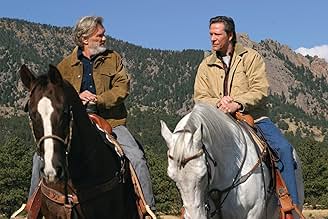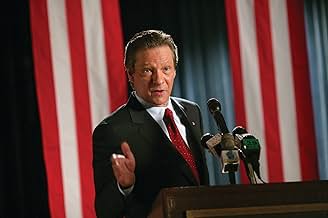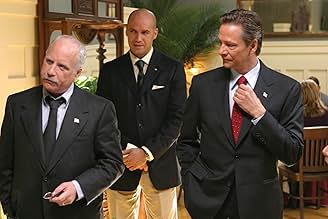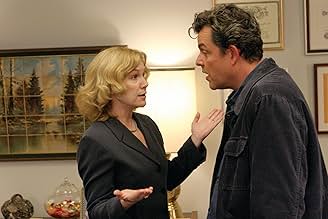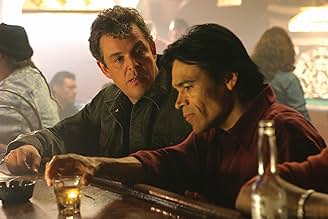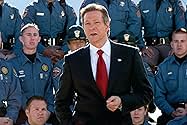Silver City
- 2004
- Tous publics
- 2h 8m
IMDb RATING
6.0/10
4.3K
YOUR RATING
The discovery of a corpse threatens to unravel a bumbling local politician's campaign for governor of Colorado.The discovery of a corpse threatens to unravel a bumbling local politician's campaign for governor of Colorado.The discovery of a corpse threatens to unravel a bumbling local politician's campaign for governor of Colorado.
- Awards
- 1 win & 1 nomination total
- Director
- Writer
- All cast & crew
- Production, box office & more at IMDbPro
Featured reviews
Pretty scary film, with its only slightly veiled alignment with Bush's environmental and immigration policies(contradiction in terms to be sure!), this uneven and fragmented film missed the mark in great film-making but hit it somewhat in its frightening depiction of the real power behind the powers that appear to be in charge in today's politics.
Cris Cooper's character's dysfunction with the English language was so very similar to Bush's and really appeared pathetic in a man running for governor, but to his credit he didn't say "nucular" one time but did have that same unfortunate impromptu speaking difficulty that Bush has when speaking off the cuff. Really embarrassing and hard to watch, just like with Bush.
Kris Kristofferson's crusty, empire-building, power-mad, money-grubbing, Sagebrush-Rebellion character scared the hell out of me in the same way Dick Cheney does, as did R. Dreyfuss' Karl Rove-like character. Both were excellent as the roles fit them well. Wayyyyyy creepy both, but even more scary to know that real people exist that are just exactly that way and are running our country!!!
The Huston family entry in this film was the loser protagonist, but a weak choice for the leading role due to his too-laid-back style and little boy, disingenuous big smile, plus his family's obvious star-making push behind him. "Let's get the boy a job" shouldn't be the reason for casting movie leads. A more bulldogged, but younger James Woods or Richard Dreyfus-type lead would have been much more credible in the role, and probably would have saved the film. Darryl Hannah was very good in her small role as the slutty, trust-fund sister of the candidate, uselessly taking up space in life but apparently giving lots of men good times in the sack through the years.(On 2nd thought, maybe not so useless after all.)
Overall, this film made me sad and uncomfortable. Sad to know that it characterized so well the political attitudes in the American presidential office today, the very one that will make all of us suffer greatly until it is finally unseated. But, also sad that the film was not put together a bit better with the good actors and story it had. Then, it could have been as effective and as good as "Wag The Dog".
Cris Cooper's character's dysfunction with the English language was so very similar to Bush's and really appeared pathetic in a man running for governor, but to his credit he didn't say "nucular" one time but did have that same unfortunate impromptu speaking difficulty that Bush has when speaking off the cuff. Really embarrassing and hard to watch, just like with Bush.
Kris Kristofferson's crusty, empire-building, power-mad, money-grubbing, Sagebrush-Rebellion character scared the hell out of me in the same way Dick Cheney does, as did R. Dreyfuss' Karl Rove-like character. Both were excellent as the roles fit them well. Wayyyyyy creepy both, but even more scary to know that real people exist that are just exactly that way and are running our country!!!
The Huston family entry in this film was the loser protagonist, but a weak choice for the leading role due to his too-laid-back style and little boy, disingenuous big smile, plus his family's obvious star-making push behind him. "Let's get the boy a job" shouldn't be the reason for casting movie leads. A more bulldogged, but younger James Woods or Richard Dreyfus-type lead would have been much more credible in the role, and probably would have saved the film. Darryl Hannah was very good in her small role as the slutty, trust-fund sister of the candidate, uselessly taking up space in life but apparently giving lots of men good times in the sack through the years.(On 2nd thought, maybe not so useless after all.)
Overall, this film made me sad and uncomfortable. Sad to know that it characterized so well the political attitudes in the American presidential office today, the very one that will make all of us suffer greatly until it is finally unseated. But, also sad that the film was not put together a bit better with the good actors and story it had. Then, it could have been as effective and as good as "Wag The Dog".
Dickie Pilager is running for governor of Colorado. He's a good-looking frat boy with a dubious past that includes at least one drunken-driving charge. But he comes from a politically influential family and his daddy's a powerful U.S. senator. Dickie, however, lacks panache. He can't put together a simple sentence without stumbling. He's terrible when he's unscripted, cannot function without a teleprompter, doesn't have a clue what he's talking about, reduces policies to simple catch-phrases, but the wealthy contribute generously to his campaign and he's awfully "user-friendly" to big business. As one character in "Silver City" points out, Dickie sounds gubernatorial on TV when the sound's muted. Sound familiar?
In "Silver City," writer/editor/director John Sayles rolls a "Chinatown"-esque murder mystery, cynical political commentary and pointed observations about contemporary media into one film that succeeds more often than not. There are moments when I got the impression Sayles was trying too hard to drive home his point about Dickie's incompetence. As fun as it might have been to mock Dickie, he's too easy a target. The greasy players around Dickie - for instance, his handler Chuck Raven (played with smarmy charm by Richard Dreyfuss) - are far more interesting. Where "Silver City" crackles is in its distrust of our political system, the influence of slimy corporate types on candidates and ineptitude of the media.
Despite this being one of Sayles' weaker films, he remains one of the finest filmmakers this nation has produced in the last 25 years. His filmography contains some of the best independent films in recent memory - "Return of the Secaucus 7" (1980), "Lianna" (1983), "Matewan" (1987), "Eight Men Out" (1988), "Passion Fish" (1992), his masterpiece, "Lone Star" (1996) and "Men With Guns" (2000). Even much of his lesser-known works, "City of Hope" (1991), "The Secret of Roan Inish" (1994) and "Limbo" (1999), are remarkable pieces of storytelling. He's also socially conscious, acutely aware of the importance of shedding light on social problems, be they the plight of immigrants, childless couples or corruptibility of politicians.
What's ultimately a bit disappointing about "Silver City" is not so much its multi-layered story, but Sayles' inability to keep it tightly wound. As much as I admire Sayles, another editor with a fresh set of eyes might have helped tremendously.
He's deftly handled multi-story plots before, but this film doesn't seem keenly focused. Sayles weaves too many threads that don't patch together all that well. He relies a bit too much on coincidence - especially using two migrant workers in a pivotal plot point - to unravel his mystery and many interesting subplots and characters remain dangling, most glaringly a subplot involving reporter Nora (an under-used Mario Bello) and her fiancé Chandler (Billy Zane), a self-proclaimed "champion of the underdog" - he's a big-business and tobacco lobbyist.
The actors, many of them Sayles regulars, are terrific, as usual. Chris Cooper plays Dickie with great aplomb, but Sayles surprisingly wastes other talented actors in throwaway roles. Tim Roth, Thora Birch and Daryl Hannah have little to do in roles that scream for more importance. Hannah gets some of the best dialogue, but her Maddy Pilager needed more screen time.
Sayles' Jake Gittes is reporter-turned-investigator Danny O'Brien, who's more akin to Elliot Gould's Marlowe than Bogart's. Danny Huston plays O'Brien with tremendous charm, but Huston lacks the magnetism of his sister, father or grandfather. David Strathairn might have worked better. Another Sayles regular, Joe Morton, would have been a fascinating choice.
Sayles' cynicism about our wimpy media and political process is well founded. We're, after all, living in an age when the media ignored the real story behind the Florida debacle in the 2000 election (the disenfranchisement of hundreds, if not thousands, of black voters); reporters shirk their duties for fear of being branded as unpatriotic; major newspapers issue mea culpas for swallowing everything this administration served up, never questioning its motives in the lead up to the (utterly meaningless and pointless) war in Iraq; political candidates hold "town meetings" with pre-screened audiences who sign loyalty oaths and serve up pre-arranged softball questions; and at least one TV news network's mostly a mouthpiece for a political party.
Sayles' forte's always been excellent dialogue and when he moves away from Dickie, the writing often is smart, piercing and worthy of his best work. There are two especially razor-sharp moments - between Chuck and Danny at a bar, and a post-coitus Maddy.
"Silver City" is by no means mediocre. And, frankly, even mediocre Sayles would be better than most of what Hollywood makes. Though this film still is better than most at the multiplex right now, this is sub par Sayles. He set the standard so high with "Matewan" and "Lone Star" that we expect better from him.
"Silver City" concludes on a symbolic, cautionary note about the dangers of allowing the Dickie Pilagers of this world to win. The scary thing is we already have a real-life Dickie Pilager. And despite his good intentions, he's more dangerous than anyone fiction could ever create.
In "Silver City," writer/editor/director John Sayles rolls a "Chinatown"-esque murder mystery, cynical political commentary and pointed observations about contemporary media into one film that succeeds more often than not. There are moments when I got the impression Sayles was trying too hard to drive home his point about Dickie's incompetence. As fun as it might have been to mock Dickie, he's too easy a target. The greasy players around Dickie - for instance, his handler Chuck Raven (played with smarmy charm by Richard Dreyfuss) - are far more interesting. Where "Silver City" crackles is in its distrust of our political system, the influence of slimy corporate types on candidates and ineptitude of the media.
Despite this being one of Sayles' weaker films, he remains one of the finest filmmakers this nation has produced in the last 25 years. His filmography contains some of the best independent films in recent memory - "Return of the Secaucus 7" (1980), "Lianna" (1983), "Matewan" (1987), "Eight Men Out" (1988), "Passion Fish" (1992), his masterpiece, "Lone Star" (1996) and "Men With Guns" (2000). Even much of his lesser-known works, "City of Hope" (1991), "The Secret of Roan Inish" (1994) and "Limbo" (1999), are remarkable pieces of storytelling. He's also socially conscious, acutely aware of the importance of shedding light on social problems, be they the plight of immigrants, childless couples or corruptibility of politicians.
What's ultimately a bit disappointing about "Silver City" is not so much its multi-layered story, but Sayles' inability to keep it tightly wound. As much as I admire Sayles, another editor with a fresh set of eyes might have helped tremendously.
He's deftly handled multi-story plots before, but this film doesn't seem keenly focused. Sayles weaves too many threads that don't patch together all that well. He relies a bit too much on coincidence - especially using two migrant workers in a pivotal plot point - to unravel his mystery and many interesting subplots and characters remain dangling, most glaringly a subplot involving reporter Nora (an under-used Mario Bello) and her fiancé Chandler (Billy Zane), a self-proclaimed "champion of the underdog" - he's a big-business and tobacco lobbyist.
The actors, many of them Sayles regulars, are terrific, as usual. Chris Cooper plays Dickie with great aplomb, but Sayles surprisingly wastes other talented actors in throwaway roles. Tim Roth, Thora Birch and Daryl Hannah have little to do in roles that scream for more importance. Hannah gets some of the best dialogue, but her Maddy Pilager needed more screen time.
Sayles' Jake Gittes is reporter-turned-investigator Danny O'Brien, who's more akin to Elliot Gould's Marlowe than Bogart's. Danny Huston plays O'Brien with tremendous charm, but Huston lacks the magnetism of his sister, father or grandfather. David Strathairn might have worked better. Another Sayles regular, Joe Morton, would have been a fascinating choice.
Sayles' cynicism about our wimpy media and political process is well founded. We're, after all, living in an age when the media ignored the real story behind the Florida debacle in the 2000 election (the disenfranchisement of hundreds, if not thousands, of black voters); reporters shirk their duties for fear of being branded as unpatriotic; major newspapers issue mea culpas for swallowing everything this administration served up, never questioning its motives in the lead up to the (utterly meaningless and pointless) war in Iraq; political candidates hold "town meetings" with pre-screened audiences who sign loyalty oaths and serve up pre-arranged softball questions; and at least one TV news network's mostly a mouthpiece for a political party.
Sayles' forte's always been excellent dialogue and when he moves away from Dickie, the writing often is smart, piercing and worthy of his best work. There are two especially razor-sharp moments - between Chuck and Danny at a bar, and a post-coitus Maddy.
"Silver City" is by no means mediocre. And, frankly, even mediocre Sayles would be better than most of what Hollywood makes. Though this film still is better than most at the multiplex right now, this is sub par Sayles. He set the standard so high with "Matewan" and "Lone Star" that we expect better from him.
"Silver City" concludes on a symbolic, cautionary note about the dangers of allowing the Dickie Pilagers of this world to win. The scary thing is we already have a real-life Dickie Pilager. And despite his good intentions, he's more dangerous than anyone fiction could ever create.
I was disappointed by this. Oh, it is great fun goofing on any politician, the more smarmy and sanctimonious the better. But I can get political goofs by the dump truck load from elsewhere. What I expected was something as gently incisive as, say, "Doonesbury," but with the cinematic skills we know Sayles has. Something as gentle and sharp as "tanner on Tanner."
We have three threads here. The first is the depiction of the system, the handlers and supporters that "make" a president. We all know how it is; many politicians admit it and nearly all journalists report on it. There isn't a shred of newness in this thread, and surely not out of Dreyfuss.
There's a second component having to do with the story that wraps the thing. Now here is where I expected some art. What we end up with a single big corporation as the bad guy, no, beyond that a single corporate man. Then we see how his misdeeds unravel a bit. Sure, we have payoffs, bribery, rampant disregard for the environment and a cover-up.
But see. The thing to make fun of is how some reduce big complex issues to simple narratives. How they take a million threads of a complex tapestry with inscrutable hues and patterns and reduce it to a paper towel with flag patterns. So why do the same thing when satirizing them? Why? It isn't as if there aren't people in the film world incapable of doing this? Or was it just a rush job?
Most people let all that slip because Chris Cooper's version is too delicious. Here's the problem with this: its not disturbing enough. The thing with the target's speech is how he needs to have his mouth work, but his mind cannot produce the coherent thought fast enough, so it looks for stored phrases and tries to evaluate them for appropriateness on the fly. This gives both odd pauses and sometimes goofy leaps in concepts and metaphors.
Listen to Cooper and pay attention to the leaps. Both are fabricated for dramatic effect. The pauses are regular. They're not even, but they have multiples: pause, twice as long three times as long. And they have a rhythm that if you listen makes a sort of sense.
Now look at the linguistic leaps. They have the same patterns, regular semantic distances. That's because we as viewers have to be in on the joke. We know he will jump and precisely how far. We just don't know the direction. See, humor is in the unexpected and in order for it to work, you need to set expectations.
Now, dear reader, listen to the target. He is not creating something as art, he is just living. What you will find is a well-studied artifact of a man whose cognitive centers have been damaged by cocaine saturation. There is no regularity. Pauses are random. The semantic distances are random. That's the whole point. This is what you find in substance abusers. Always. It is not dumbness but drug damage.
Oddly the National Institutes of Health had a great research program on this because all sorts of conditions like Alzheimers can be diagnosed by measuring these speech effects. But once the link was make to cocaine users, the program was terminated. Now that would make a good movie, Huh?
Ted's Evaluation -- 2 of 3: Has some interesting elements.
We have three threads here. The first is the depiction of the system, the handlers and supporters that "make" a president. We all know how it is; many politicians admit it and nearly all journalists report on it. There isn't a shred of newness in this thread, and surely not out of Dreyfuss.
There's a second component having to do with the story that wraps the thing. Now here is where I expected some art. What we end up with a single big corporation as the bad guy, no, beyond that a single corporate man. Then we see how his misdeeds unravel a bit. Sure, we have payoffs, bribery, rampant disregard for the environment and a cover-up.
But see. The thing to make fun of is how some reduce big complex issues to simple narratives. How they take a million threads of a complex tapestry with inscrutable hues and patterns and reduce it to a paper towel with flag patterns. So why do the same thing when satirizing them? Why? It isn't as if there aren't people in the film world incapable of doing this? Or was it just a rush job?
Most people let all that slip because Chris Cooper's version is too delicious. Here's the problem with this: its not disturbing enough. The thing with the target's speech is how he needs to have his mouth work, but his mind cannot produce the coherent thought fast enough, so it looks for stored phrases and tries to evaluate them for appropriateness on the fly. This gives both odd pauses and sometimes goofy leaps in concepts and metaphors.
Listen to Cooper and pay attention to the leaps. Both are fabricated for dramatic effect. The pauses are regular. They're not even, but they have multiples: pause, twice as long three times as long. And they have a rhythm that if you listen makes a sort of sense.
Now look at the linguistic leaps. They have the same patterns, regular semantic distances. That's because we as viewers have to be in on the joke. We know he will jump and precisely how far. We just don't know the direction. See, humor is in the unexpected and in order for it to work, you need to set expectations.
Now, dear reader, listen to the target. He is not creating something as art, he is just living. What you will find is a well-studied artifact of a man whose cognitive centers have been damaged by cocaine saturation. There is no regularity. Pauses are random. The semantic distances are random. That's the whole point. This is what you find in substance abusers. Always. It is not dumbness but drug damage.
Oddly the National Institutes of Health had a great research program on this because all sorts of conditions like Alzheimers can be diagnosed by measuring these speech effects. But once the link was make to cocaine users, the program was terminated. Now that would make a good movie, Huh?
Ted's Evaluation -- 2 of 3: Has some interesting elements.
John Sayles repeats himself in "Silver City," borrowing very heavy-handedly from his much more effective takes on local politics and the environment that spawns it, from his "City of Hope" (urban NJ), "Lone Star" (Texas)--which also featured Kris Kristofferson in a not dissimilar role-- and "Sunshine State" (Florida), though now he's taking on Colorado.
Other actors also seem to be present for their resonance from other features, Michael Murphy from "Tanner 88," Daryl Hannah almost as crazy as she was in "Kill Bill, Volume 2," and Richard Dreyfuss channeling Duddy Kravitz as a campaign manager.
While Chris Cooper is very effective in capturing a George W. Bush-type politician from a family dynasty, Danny Huston switches confusingly from cynical ex-journalist/investigator to naif as he uncovers a scandal with ever-widening yet encircling entanglements of class, ethnicity, media, real estate, wildlife, etc. etc.
While the satire is scarily amusing, the final scene of this overlong film is literally overkill.
Sayles as usual carefully picks the songs on the soundtrack, here there's frequent Cowboy Junkies tracks.
Other actors also seem to be present for their resonance from other features, Michael Murphy from "Tanner 88," Daryl Hannah almost as crazy as she was in "Kill Bill, Volume 2," and Richard Dreyfuss channeling Duddy Kravitz as a campaign manager.
While Chris Cooper is very effective in capturing a George W. Bush-type politician from a family dynasty, Danny Huston switches confusingly from cynical ex-journalist/investigator to naif as he uncovers a scandal with ever-widening yet encircling entanglements of class, ethnicity, media, real estate, wildlife, etc. etc.
While the satire is scarily amusing, the final scene of this overlong film is literally overkill.
Sayles as usual carefully picks the songs on the soundtrack, here there's frequent Cowboy Junkies tracks.
You'll never look at "W" again without thinking of Dickie Pilager! Nice piece of political satire and all too true. Well shot...well acted... and well directed. The characters are slightly "comic bookish" but consider their real life counterparts.
Be sure to look at the "Additional features" on the DVD. It contains some very pointed social commentary from some very concerned and talented individuals. This movie is probably more important now that we have had the election outcome of 2004.
The Haskell Wexler cinematography is really excellent. Be sure to notice the backgrounds when he is interviewed!
Be sure to look at the "Additional features" on the DVD. It contains some very pointed social commentary from some very concerned and talented individuals. This movie is probably more important now that we have had the election outcome of 2004.
The Haskell Wexler cinematography is really excellent. Be sure to notice the backgrounds when he is interviewed!
Did you know
- TriviaThe Bentel company logo is a direct copy from Bechtel Corporation which is a real American defense contractor.
- GoofsWhen Danny is splashing in the mine, the type of flashlight he is holding changes several times.
- ConnectionsReferenced in Tell Them Who You Are (2004)
- SoundtracksMining for Gold
Written by Philip Thomas and James Gordon
Performed by Cowboy Junkies
Courtesy of BMG Music Canada Inc.
Under license from BMG Film & TV Music
- How long is Silver City?Powered by Alexa
Details
Box office
- Budget
- $5,000,000 (estimated)
- Gross US & Canada
- $1,020,656
- Opening weekend US & Canada
- $337,484
- Sep 19, 2004
- Gross worldwide
- $1,384,395
- Runtime
- 2h 8m(128 min)
- Color
- Sound mix
- Aspect ratio
- 1.85 : 1
Contribute to this page
Suggest an edit or add missing content



